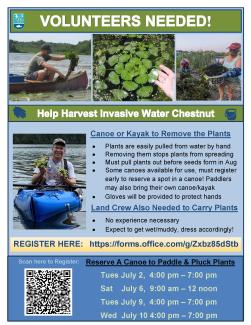
Several environmental organizations in Rhode Island and Massachusetts are banding together in calling for volunteers to help harvest invasive water chestnuts, an invasive plant found in several local ponds. Volunteers are needed at Turner Reservoir to gently weed the invasive plants out of the water before the seeds form at the end of July.
Community harvesting events are scheduled: Tuesdays, July 2 and 9, from 4-7pm, Wednesday, July 10 and Saturday, July 6 from 9 am to noon.
Non-boating volunteers can stay ashore and help haul the containers from boats to unload the plants for disposal. Wheelbarrows will be provided to compost the plant on site. Paddlers who bring their own canoe or kayak, boaters with small trolling motors, or even anglers donning their chest waders can help by plucking plants out of the water. Volunteers will be provided a bucket or laundry basket and gloves to collect plants. Free canoes will be available on-site to use for the event, provided by the Friends of the Blackstone/Blackstone River Watershed Council. Interested volunteers must pre-register here to reserve their spot in a canoe.
Turner Reservoir in East Providence is a popular fishing and kayaking spot, supporting an important bass fishery, local wildlife photography and bird watching. The problematic plant, water chestnut (Trapa natans), is a highly aggressive invasive, growing and multiplying quickly to cover the water’s surface. The invasive plant threatens fishing, boating, and paddling opportunities, disturbs the healthy balance of native plants and healthy wildlife habitat, and becomes costly to manage after only four to five years of unchecked growth. As a partners on the project, RIDEM and the Town of East Providence, RI are tackling the invasive plant at both Central Pond and Turner Reservoir along the MA-RI border. The larger regional project is led by the New England Interstate Water Pollution Control Commission (NEIWPCC) to help local organizations learn to manage invasive water chestnut. The project is funded by a grant to NEIWPCC from the Southeast New England Program (SNEP)’s Watershed Implementation Grants to help restore aquatic habitats. Successful volunteer hand pulling events have been held so far by the Blackstone River Watershed Council (BRWC)/ Friends of the Blackstone, the Blackstone Valley Tourism Council (BVTC), and Lake Quinsigamond Watershed Association.
Utilizing the SNEP grant funding, East Providence will be working with licensed contractors to treat Central Pond (that area north of Newman Avenue) and the eastern shoreline of Turner Reservoir with EPA-registered chemical herbicides in order to get the invasive plant under control. Central Pond has the largest population of water chestnut in RI, covering over 50 acres of the 137 acre pond. Further upstream, the City of Attleboro is also treating Dodgeville Pond to reduce the water chestnuts as part of the SNEP funded project to address the problem from a holistic watershed perspective. However, volunteers are still needed in Turner Reservoir south of Newman Ave, along the Seekonk shoreline to remove isolated plants before they become an issue. This is the forth year in a row that volunteers have been recruited to help weed at Turner Reservoir to keep it under control, and successful efforts to date have stopped water chestnut from rapidly expanding like they have to the north in Central Pond. Volunteers have reported it to be a fun, but calm activity on the water that is extremely rewarding to watch the weeds pile up. Registered volunteers will receive additional information, and updates such as any rain cancelations.
RIDEM has been successfully managing water chestnut each year at several locations in the state, with annual monitoring and surveillance to weed out any new seedlings that germinate. Such small actions a few days per year at each pond helps to curb the further spread of water chestnut, keeping the water clear of the annual plant. This type of consistent effort is required each summer, as seeds of the plant can lie dormant in the muck for up to 12 years, or new seeds may be introduced to the pond.
